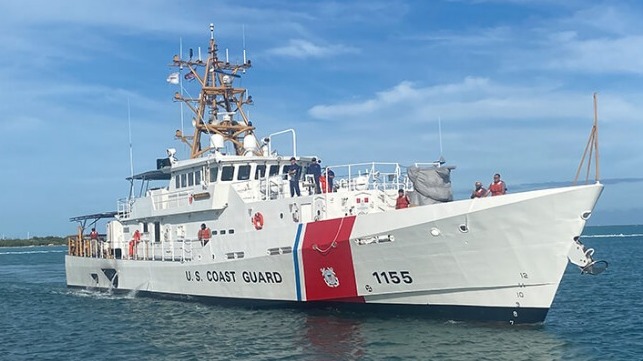USCG Marks Milestone with Acceptance of 55th Fast Response Cutter

Bollinger Shipyards and the U.S. Coast Guard marked a milestone on Thursday as the Louisiana-based shipbuilder delivered the 55th Fast Response Cutter in a program that began 15 years ago and which the USCG expects to continue for several more years. The Fast Response cutter, known as the Sentinel class, has become cutter is a key component of the Coast Guard’s offshore fleet.
The program launched in 2008 as a replacement for the aging Island-class 110-foot patrol boats. The Coast Guard reports it selected a “parent-craft” design for the Sentinel-class cutters to ensure that the operating force received new vessels capable of performing the required missions, as quickly as possible. The Coast Guard coined the term “parent-craft” to describe the use of an existing ship design that has successfully performed equivalent missions.
The first of the class was commissioned 13 years ago in 2012, the Bernard C. Webber. This year alone Bollinger has delivered four of the vessels to the Coast Guard. The program is currently funded for 65 vessels although the Coast Guard’s FY2024 Unfunded Priorities List includes procuring four more vessels of the class (which would be the 66th through 69th vessels in the program) to provide increased Coast Guard presence and engagement with allied and partner countries in the Indo-Pacific region.
Each of the vessels measures 154 feet and Bollinger reports they have a flank speed of 28 knots. The shipyard reports that senior Coast Guard officials have called the class an operational “game changer.” It provided the Coast Guard with expanded operational reach and capabilities, and the ability to transform and adapt to the mission. FRCs have conducted operations as far as the Marshall Islands—a 4,400 nautical mile trip from their homeport and conduct missions ranging from port, waterways, and coastal security, to fishery patrols, search and rescue, and national defense. They operate with a crew of 24 and are designed for missions up to five days and a range of 2,500 nautical miles.
“We’re confident that pound for pound, the quality and capabilities of the FRC platform are unmatched and that this vessel will outperform its mission requirements and expectations in the challenging conditions where it will operate in the North Atlantic,” said President & CEO Ben Bordelon during the handover ceremony in Key West, Florida.

USCG photo of one of the vessels of the class at speed (USCG)
The latest vessel is the USCGC Melvin Bell, the final of six Fast Response Cutters to be homeported in Boston. Each FRC is named for an enlisted Coast Guard hero who distinguished themselves in the line of duty. Bell, a minority pioneer, and Pacific war hero had a distinguished career spanning 65 years in military and civil service. In 1943, he became the first Pacific Islander advanced to chief petty officer. He later held the distinction of a dual rating as Chief Radioman and Chief Electronics Technician. In 1958, he became the first minority Master Chief in the history of the Coast Guard.

that matters most
Get the latest maritime news delivered to your inbox daily.
The new vessel joins the USCGC Maurice Jester delivered in March as number 52, USCGC John Patterson delivered in May as 53, and USCGC William Sparling delivered in July as the 54th vessel in the program. All four of the vessels delivered this year have been assigned to Boston. The sector is responsible for coastal safety, security, and environmental protection from the New Hampshire-Massachusetts border southward to Plymouth, Massachusetts out to 200nm offshore. Sector Boston directs over 1,500 Active Duty, Reserve, and Auxiliary members.
The Coast Guard highlights that the class is active from its bases in Florida, Massachusetts, California, Texas, New Jersey, Mississippi, North Carolina, Alaska, and Hawaii. They also have stationed the vessels in Puerto Rico, Gaum, and even in Bahrain. Future FRC homeports include Astoria, Oregon, and Kodiak and Seward, Alaska.
